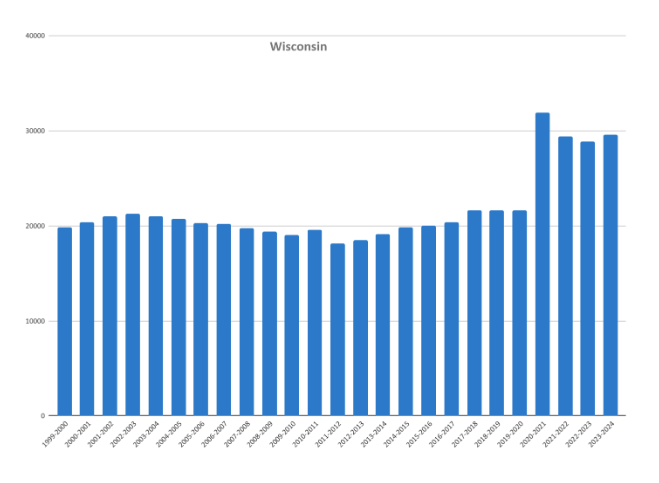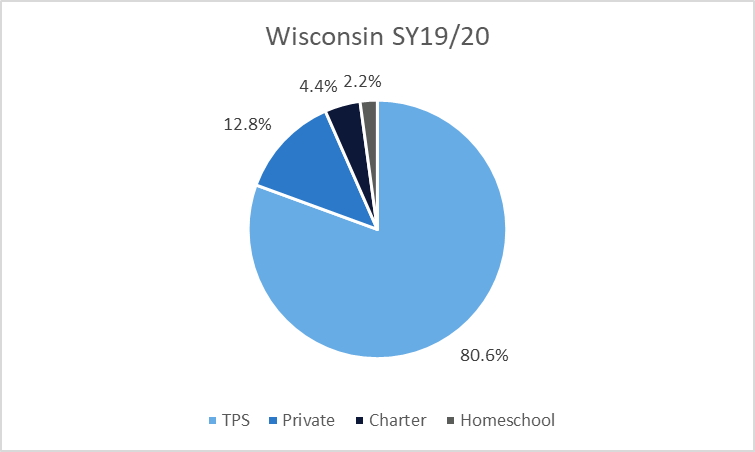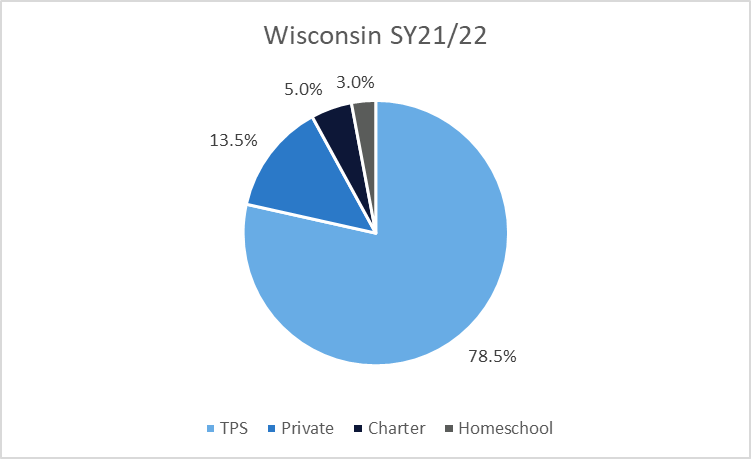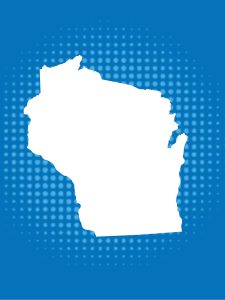Wisconsin may consider virtual school a form of homeschooling.
History
Wisconsin, in the midwestern United States, legalized homeschooling in 1983. Parents or other designated persons can legally teach homeschooled students. Still, current law does not allow for the instruction of children from more than one family in a homeschool. Wis. Stats. §115.001(3g). Homeschool is not considered private or nonpublic schooling in Wisconsin.
Regulation
Wisconsin offers one option for homeschooling. The state requires parents who elect to homeschool their children, ages 6 to 18, to submit an online form declaring their intention. The PI-1206 Homeschool Enrollment Report must be filed annually between July and mid-October. Students must receive at least 875 hours of annual instruction between July and June. Wis. Stat. sec.118.165(1). Parents are not otherwise required to keep attendance records. The statute specifies the program must provide a “… sequentially progressive curriculum of fundamental instruction in reading, language arts, mathematics, social studies, science, and health.” There are no minimum parental education requirements for homeschooling or testing/evaluation requirements for homeschooled students in Wisconsin.
Under the part-time attendance law, homeschooled students may participate in a maximum of two courses per semester at any public school. A student could take a class at two different schools under this law. Access depends on available space; parents are advised to contact the school they wish to attend for more information. Homeschooled students can also participate in interscholastic sports on the same basis and to the same extent that is permitted to students enrolled in the district. Wis. Stat 118.133(1) Homeschooled students have unlimited access to extracurricular activities at their local public school. Despite the broad access described above, homeschooled students with special needs are not eligible for special services in public schools.
State Data
Wisconsin collects and publicly reports annual homeschool participation information. For example, around 20,000 students reported homeschooling in 2000 which increased to over 30,000 at the height of the pandemic. The state also provides robust disaggregated information on homeschooled students by grade, district, and more.

U.S. Census estimates indicate that around 3.5% of Wisconsin families homeschooled in the spring of 2020 and increased to 8.1% by the fall of 2020. This participation falls below the national averages of 5.4% and 11.1% for this time period. Based on U.S. Census data, our calculations indicate that about 5.12% of K-12 students in Wisconsin were homeschooled during the 2022-23 school year, and 4.87% during the 2023-24 school year. Due to survey changes, the data from 2020 reflects the percentage of households, while the data from following years reflects the percentage of students.
Cross-Sector Comparison
During the 2019-20 academic year, 2.2% of Wisconsin’s K-12 students were homeschooled. The percentage of students attending charter schools was double that of homeschooled students, at 4.4%. The portion of students attending private schools was even larger, at 12.8%. In 2021-22, 3.0% of Wisconsin’s K-12 students were homeschooled, 5.0% attended charter schools, and 13.5% attended private schools.


School Choice Context
In addition to homeschooling, parents in Wisconsin have many educational choices available which could contribute to why there is low homeschool participation. These options include inter- and intra-district choice in traditional public schools, magnet schools, and many charter schools. Wisconsin also has five different private school choice programs; none of the programs provide funding for homeschool families.
Commentary
Wisconsin collects and publicly reports important data on homeschool participation. Wisconsin provides broad access to public school offerings for homeschooled students, but this access does not include services for students with special needs.

-
8.1% Families
Around 8.1% of families in Wisconsin homeschooled during the height of the pandemic (Fall 2020).
-
1983 Legalized
Homeschooling was legalized in 1983 in the state of Wisconsin.
-

8.1% Families
Around 8.1% of families in Wisconsin homeschooled during the height of the pandemic (Fall 2020).
1983 Legalized
Homeschooling was legalized in 1983 in the state of Wisconsin.

Last updated March 2025.